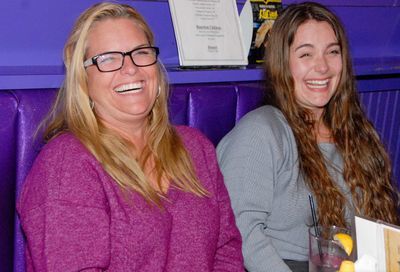North Carolina Republicans Override Vetoes of Anti-Trans Bills
With override, lawmakers enact a ban on gender-affirming care, a ban on transgender athletes, and a "Don't Say Gay"-style law.

North Carolina Republican lawmakers voted to override three vetoes from Democratic Gov. Roy Cooper to allow enact a spate of anti-LGBTQ legislation.
The North Carolina House of Representatives and Senate voted to override Cooper’s veto of a bill that bars medical professionals from prescribing gender-affirming treatments to transgender-identifying or gender-nonconforming minors. The vote was largely along party lines, with only two House Democrats voting for the override, reports the Associated Press.
The new law, which prohibits access to hormone therapy, puberty-blocking drugs, and gender confirmation surgery although minors who had begun treatment prior to Aug. 1 may continue receiving puberty blockers or hormones if their doctors deem it medically necessary and their parents consent. As a result, North Carolina has become the 22nd state to enact legislation restricting minors’ ability to access to gender-affirming care.
State Sen. Lisa Grafstein (D-Raleigh), the state’s only out LGBTQ state senator, said the ban on gender-affirming care “may be the most heartbreaking bill in a truly heartbreaking session.”
But Sen. Joyce Krawiec (R-Kernersville), the primary sponsor, insisted that the law was needed to protect children from undergoing potentially irreversible medical procedures that they may one day regret.
Gender-affirming care is widely recommended by most mainstream medical organizations, including the American Medical Association and the Endocrine Society, for people suffering from gender dysphoria. Surgical interventions remain rare among minors, but puberty blockers and hormones may be more common. The American Academy of Pediatrics recently unanimously affirmed its support for gender-affirming health care to treat gender dysphoria, while calling for a review of the medical evidence supporting the use of hormonal interventions.
Some LGBTQ advocates in the Senate gallery began yelling and had to be escorted out by Capitol Police after Republican Lt. Gov. Mark Robinson, as the presiding officer of the Senate, cut off Grafstein’s remarks to allow another lawmaker to speak.
Lawmakers also voted to override a veto of a Florida-style “Don’t Say Gay” bill prohibiting instruction about gender identity or sexual orientation in grades K-4. That law also requires that teachers alert parents if their children identifies as LGBTQ, and requires parental permission before calling a student by a different name or pronoun.
Nathaniel Dibble, a 19-year-old who protested outside the state Legislative Building, argued that the bill would put students at risk of emotional or even physical abuse by “outing” them to potentially unsupportive parents.
But Sen. Amy Galey (R-Burlington) said that parents have a right to know about every aspect of their children’s lives and education.
“Parents need to be brought into the conversation from the very beginning, not treated with suspicion or as the source of that anguish,” she said.
Lastly, lawmakers also voted to override a veto of a bill barring transgender athletes from competing on female-designated sports teams at the middle, high school, and collegiate levels.
“This is not telling anyone they can’t play,” Sen. Vickie Sawyer (R-Mooresville), argued when the bill was first passed by the Senate back in June. “This is only telling everyone that women’s sports is for women.”
Cooper blasted lawmakers for emphasizing what he called the “wrong priorities” before lawmakers were done voting.
“The legislature finally comes back to pass legislation that discriminates,” he said, warning of the negative repercussions for North Carolina youth and their families.
LGBTQ organizations slammed legislators for strong-arming the bills into law over Cooper’s genuine concerns and objections.
“Every lawmaker in North Carolina that voted to override the Governor’s veto should be ashamed of themselves,” Cathryn Oakley, a senior director for legal policy at the Human Rights Campaign, said in a statement. “These bills range in impact from curriculum censorship to school sports to banning best practice healthcare, but they have one important throughline: extremist legislators are trying to gain political power by harming vulnerable young people and their families.
“Once again, the North Carolina General Assembly has prioritized anti-transgender discrimination over the well-being of North Carolina,” Oakley said, referring to the debacle, and the resulting financial and social backlash that the state experienced following the passage of the controversial HB 2, which barred transgender people from using facilities in public buildings matching their gender identity.
“Governor Cooper did the right thing by vetoing these hateful bills designed to rile up hate against LGBTQ+ people, but legislators are sending a clear message that North Carolina is not a safe place for us,” Oakley added, while vowing to fight the new laws.
“We need to call this what it is: An all-out attack on queer and transgender youth in North Carolina. The NCGA is going out of its way to blatantly enact the far-Right’s anti-LGBTQ wish list, causing harm and discrimination to young people in every area of life, from school to the doctor’ office to the athletic fields,” Allison Scott, the director of impact and innovation at the Campaign for Southern Equality, said in a statement. “You would have thought that the NCGA would have learned its lesson from HB 2 and the havoc it caused for our state and our communities.”
Scott encouraged transgender youth, their parents and allies to reach out to the Campaign for Southern Equality’s “Southern Trans Youth Emergency Project,” which has provided more than $250,000 in funding to individuals and families supporting transgender youth throughout the South. She noted that the project could help connect trans youth and their families with resources or options for pursuing gender-affirming care out-of-state.
“We know this is a very difficult time for transgender youth and their families, and for the LGBTQ+ community and our supporters across North Carolina,” Scott said in a statement. “I also know that no law can stop the transgender community from charting our paths to thriving and living authentically — our community will make sure of that. … We are sending solidarity and love during this relentless time.”
Support Metro Weekly’s Journalism
These are challenging times for news organizations. And yet it’s crucial we stay active and provide vital resources and information to both our local readers and the world. So won’t you please take a moment and consider supporting Metro Weekly with a membership? For as little as $5 a month, you can help ensure Metro Weekly magazine and MetroWeekly.com remain free, viable resources as we provide the best, most diverse, culturally-resonant LGBTQ coverage in both the D.C. region and around the world. Memberships come with exclusive perks and discounts, your own personal digital delivery of each week’s magazine (and an archive), access to our Member's Lounge when it launches this fall, and exclusive members-only items like Metro Weekly Membership Mugs and Tote Bags! Check out all our membership levels here and please join us today!




























